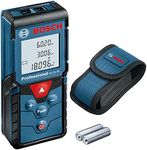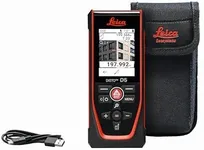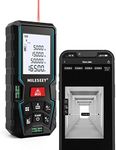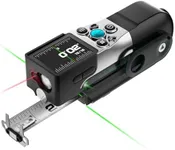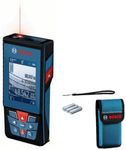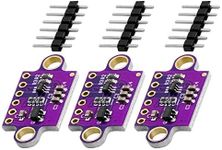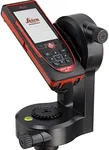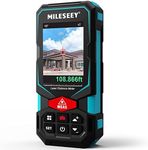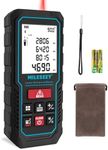Buying Guide for the Best Laser Measures
When choosing a laser measure, it's important to consider the specific needs of your projects. Laser measures are handy tools for accurately measuring distances, areas, and volumes, and they can save you a lot of time compared to traditional tape measures. The right laser measure for you will depend on the type of work you do, the distances you need to measure, and any additional features that might make your job easier. Understanding the key specifications will help you make an informed decision.Measuring RangeThe measuring range of a laser measure indicates the maximum distance it can accurately measure. This is important because it determines the scope of projects you can tackle. Ranges can vary from about 30 feet to over 300 feet. For indoor use or smaller projects, a shorter range may suffice. However, for outdoor use or larger construction projects, a longer range is necessary. Consider the typical distances you need to measure to choose the right range for your needs.
AccuracyAccuracy refers to how close the laser measure's readings are to the actual distance. This is crucial for ensuring precise measurements, especially in professional settings. Accuracy is usually expressed in terms of plus or minus a certain number of millimeters or inches. Most laser measures offer accuracy within 1/16 to 1/8 of an inch. If your work requires high precision, opt for a model with better accuracy. For general use, a standard level of accuracy should be sufficient.
DisplayThe display on a laser measure shows the measurement results and sometimes additional information like battery life or settings. A clear, easy-to-read display is important for quickly understanding your measurements. Some models offer backlit displays, which are useful in low-light conditions. Consider where and how you will be using the laser measure to determine the importance of display features. If you often work in dim environments, a backlit display might be beneficial.
FunctionalityFunctionality refers to the additional features a laser measure might have, such as calculating area, volume, or indirect measurements using the Pythagorean theorem. These features can greatly enhance the versatility of the tool. If you frequently need to calculate more than just straight-line distances, look for a model with these additional functions. For basic measuring needs, a simpler model without extra features might be more appropriate.
DurabilityDurability is about how well the laser measure can withstand the conditions of your work environment. This includes resistance to dust, water, and impacts. A durable laser measure is essential if you work on construction sites or in other harsh environments. Look for models with a good IP rating, which indicates protection against dust and water. If your work is mostly indoors or in controlled environments, durability might be less of a concern.
Battery LifeBattery life determines how long the laser measure can operate before needing a recharge or battery replacement. This is important for ensuring the tool is ready to use when you need it. Battery life can vary significantly between models, with some offering rechargeable batteries and others using standard replaceable ones. Consider how often you use the tool and whether you have easy access to charging or replacement batteries when choosing a model.

